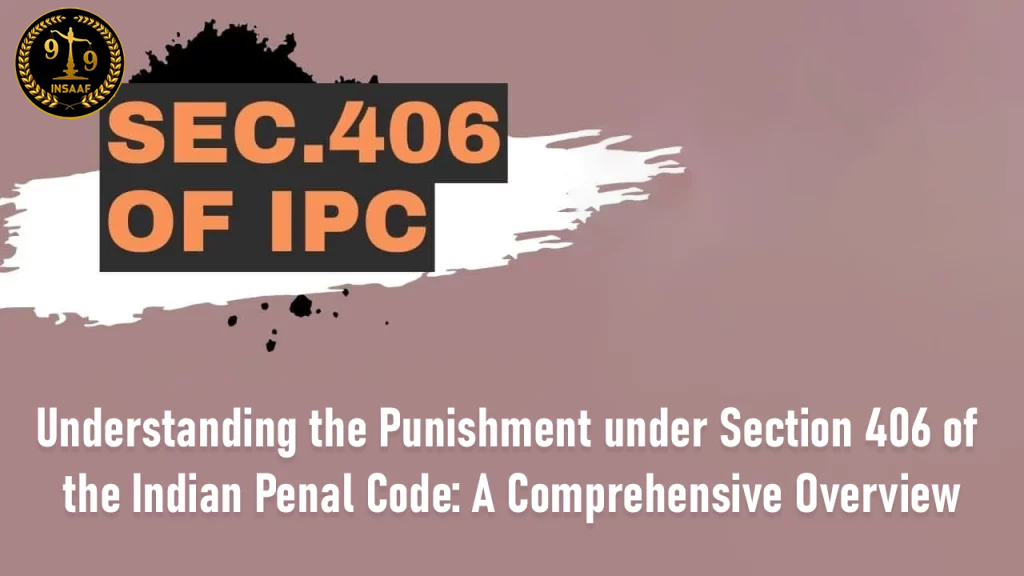

Online Legal Advice from Insaaf99® Online Lawyer Consultation in India


Online Legal Advice from Insaaf99® Online Lawyer Consultation in India

Navigating the intricate world of legal complexities, few concepts bear the weight of broken promises and breach of trust like Section 406 of the Indian Penal Code (IPC). This section dives into the realm of criminal breach of trust, outlining the repercussions for those who misuse property entrusted to them. Understanding the nuances of this crucial legal aspect is vital for individuals and businesses alike, serving as a deterrent against acts of betrayal and protecting rightful ownership.
In essence, Section 406 states that "whoever commits criminal breach of trust shall be punished with imprisonment of either description for a term that may extend to three years, or with a fine, or with both." While this wording may seem straightforward, it encapsulates a multifaceted legal reality.
Section 406 of the Indian Penal Code (IPC) deals with "Punishment for Criminal Breach of Trust." The purpose of this section is to address cases where an individual, entrusted with property or assets, dishonestly misappropriates or converts them for personal gain, thereby breaching the trust placed in them. In essence, this offense involves the betrayal of trust, leading to legal consequences for the offender.
The key aspect of this offense revolves around the term "criminal breach of trust." This refers to the unauthorized use or misappropriation of entrusted property for personal gain or the benefit of someone else, contrary to the terms of the entrustment. Examples of this include a salesman keeping client funds for personal use, a lawyer redirecting inheritance money, or a trustee selling estate assets without proper authorization.
Read Also: - Love, lust, and law: a postmortem of section 497 IPC and its lingering echoes in modern India
To establish an offense under Section 406 IPC, specific crucial elements must be present:
Entrustment: The first element involves the act of entrusting property, assets, or control over property from the complainant to the accused. This entrustment can be either explicitly stated or implied, serving as the foundation for the charge of criminal breach of trust.
Misappropriation or Conversion: The accused must have dishonestly misappropriated or converted the entrusted property for personal use or for the benefit of someone else.
This act of betrayal is at the core of the offense and establishes the wrongful diversion of entrusted assets.
Breach of Trust: The breach of trust occurs when there is a violation of the legal obligation to manage the entrusted property for the benefit of the entruster. The accused's actions must demonstrate a dishonest intention, indicating a breach of the entrusted responsibility.
These elements collectively define the offense under Section 406 IPC, emphasizing the significance of the entrusted relationship and the subsequent breach of trust.

The punishment outlined in Section 406 of the Indian Penal Code (IPC) is designed to discourage people from committing criminal breach of trust. This offense involves violating someone's trust, and the penalties seek to reflect the seriousness of such actions. Several legal nuances come into play. The offense is cognizable, meaning the police can directly arrest the accused without a warrant. It is also non-bailable, implying that securing bail can be challenging. Additionally, with the court's consent, the victim can compound the offense, allowing for settlement outside the legal system.
According to the IPC, those found guilty of criminal breach of trust under Section 406 can face imprisonment for up to three years, a fine, or both.
Imprisonment: Individuals convicted under Section 406 IPC can be sentenced to imprisonment for a period of up to three years. The court decides the specific duration based on factors such as the severity of the offense and other relevant considerations.
Fine: In addition to imprisonment, the court may impose a monetary fine on the offender. The amount of the fine is determined based on the circumstances of the case and serves as an additional punitive measure.
Compensation to the Victim: Courts may also order the convicted individual to compensate the victim for any losses suffered due to the criminal breach of trust. This compensatory aspect aims to restore the victim to the position they would have been in if the breach of trust had not occurred. It ensures that the offender takes responsibility for the harm caused to the victim.
Insaaf99, an online legal consultation platform, facilitates individuals facing issues under Section 406 IPC by connecting them with experienced legal professionals. Clients can seek timely advice, clarification on legal matters, and guidance on navigating the complexities of criminal breach of trust cases. Insaaf99 streamlines the consultation process, offering a user-friendly platform for swift and efficient communication between users and legal experts. This service enhances access to justice, providing a convenient avenue for individuals to obtain expert insights and assistance in addressing legal challenges related to Section 406 IPC, ultimately contributing to a fair and informed legal system.
Section 406 IPC plays a crucial role in safeguarding the interests of individuals and organizations by addressing dishonest misappropriation of entrusted property. The prescribed punishment under Section 406 reflects the gravity of the offense, serving as a deterrent to discourage breaches of trust. It is essential for individuals to be aware of their rights and the legal consequences associated with violating trust. By understanding the implications of Section 406 IPC, people can better appreciate the significance of upholding trust and acting responsibly in matters involving entrusted property.